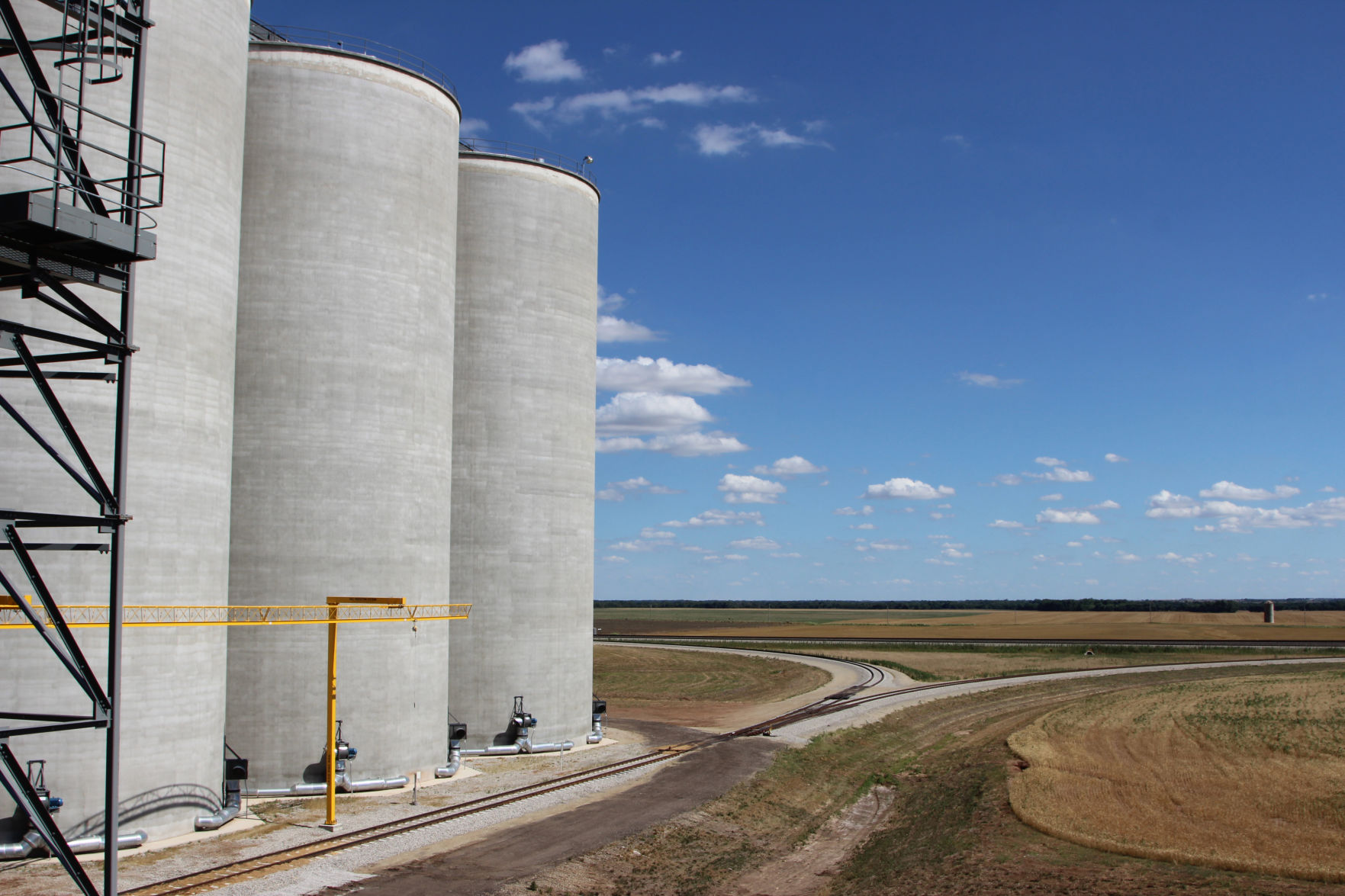Their questions ranged from capacity of the facility, to bushels per acre in the area, to how many train cars can be loaded out in an hour at the terminal.
The U.S. Grains Council sponsored a trade team for young feed millers and grain commercializers from the National Association of Food Manufacturers for Animal Consumption, June 18 to 22. On June 20, the group toured the Mid-Kansas Coop’s Sumner County Terminal near Milan, Kansas.
“It is the highest production in Kansas, probably of the world, right through here for hard red winter wheat,” said Erik Lange, senior vice president and COO of Mid-Kansas Coop.
Although rains prior to the June 20 visit caused the site to be virtually at a standstill, the team was able to tour the Sumner County terminal to see where wheat was stored and take in the view from the top of the 142 foot high storage bins. The Producer Ag LLC site, a joint venture between CHS and Team Marketing Alliance, opened in May 2017. This rail-loading terminal has 2.7 million bushels of upright slipform concrete storage and a 4.5-million-bushel flat storage building. The terminal is under the operation of MKC. The terminal accepts canola, wheat, corn and soybeans.
The terminal can take in 100,000 bushels per hour, and load grain back onto a train at the same rate, Lange said. Four different pits can handle 25,000 bushel per hour each, and all four legs that receive grain can be used to ship the grain back out by rail.
“It’s a very well designed facility so that we can do multiple things all at once,” Lange said. “We can be loading trains, dumping trucks, moving grain in house all at the same time.”
Jeff Jones, director of southern operations and manager of the Sumner County Terminal explained that a 110-car shuttle train can be loaded in about 6 ½ hours, with a limited crew.
“We don’t need a ton of guys to work it,” he said. “It’s fast, very fast.”
The terminal is on its second wheat harvest, and is a joint venture between MKC and CHS. Lange said MKC is the operating partner of the joint venture, and is leased by their grain marketing division, Team Marketing Alliance.
“It’s kind of a complex relationship, but it works very well for our group with having ownership and having the grain division operate that,” he said.
Ted Schultz, manager of Team Marketing Alliance, said they’re the marketing and logistics part of the operation, as well as train loaders, merchandizers, crop insurance agents among others.
“So anything as far as buying and selling the grain or working with how to market it,” Schultz said. “And of course were responsible for talking to the railroads and keeping in contact with them to get the grain to move.”
This year’s crops
Members of the visiting team were curious about the current crop stages, and wanted to know what conditions are looking like. For sorghum, Schultz said the last crop wasn’t very big.
“Most of it’s been sold out already before the China deal,” Schultz said. “So the milo stocks price is about the same as corn if not a little higher. Corn actually has sort of tightened up here lately.”
The cost of freight to transport grain to Mexico was discussed, and although Schultz wasn’t exactly sure about current prices, he did provide a little insight. TMA has sold trainloads to Mexico before, and year before last corn was headed that way.
“But the last year the crops weren’t that good. When the crops are just average in Kansas, we have so many feedlots and ethanol plants it all stays home,” Schultz said. “But on years when we get rain, then we have stuff that leaves.”
They were curious as to what the averages are for crop yields in the area. Lange said for Sumner County, 2018 wheat yields might reach 30 bushels an acre. Wheat yields are normally much higher.
“All the wheat to the north is spring wheat. It looks good at this point and has had good moisture,” Lange said. “We were just so dry all spring.”
The lack of rainfall hasn’t been kind to the sorghum crop too. The trade team visit was early in the growing season, and the crop did not look very good. Lange said it appeared sorghum acreage in the area was up, however.
“Not only did we have the milo that we had went to China, but the acres just kept going down and so production kept going down,” Lange said. “Last year, acres were up a little bit from previous year and I think they’ll be up a little this year but some are really, really dry right now.”
Schultz is hoping for the best as far as the sorghum crop goes.
“Assuming we get rain, and we raise a crop, and if China is still a problem if the tariff is still there. Then milo’s probably more of an 80 to 95 percent of the corn value kind of crop,” he said. “Historically that’s the way it works.”
Lange said it “ebbs and flows” in central Kansas because a lot of the grain and sorghum is used to make ethanol.
“So we do have some ethanol production that will switch over to milo if milo’s cheap enough,” Lange said.
Schultz agreed. Currently there are two ethanol plants operating with a third to go online soon.
“They’ll use milo to the tune of 90 percent if it’s cheaper than corn,” he said.
Lange said the weather is pushing things right now in his part of the state, but not other parts of the country.
“While we’re in a really dry spot right here, there’s a lot of the crop as you go towards Iowa and Nebraska that they’ve had fantastic weather,” he said. “And really that corn market has been pretty weak based upon a lot of weather information.”
Kylene Scott can be reached at 620-227-1804 or [email protected].



